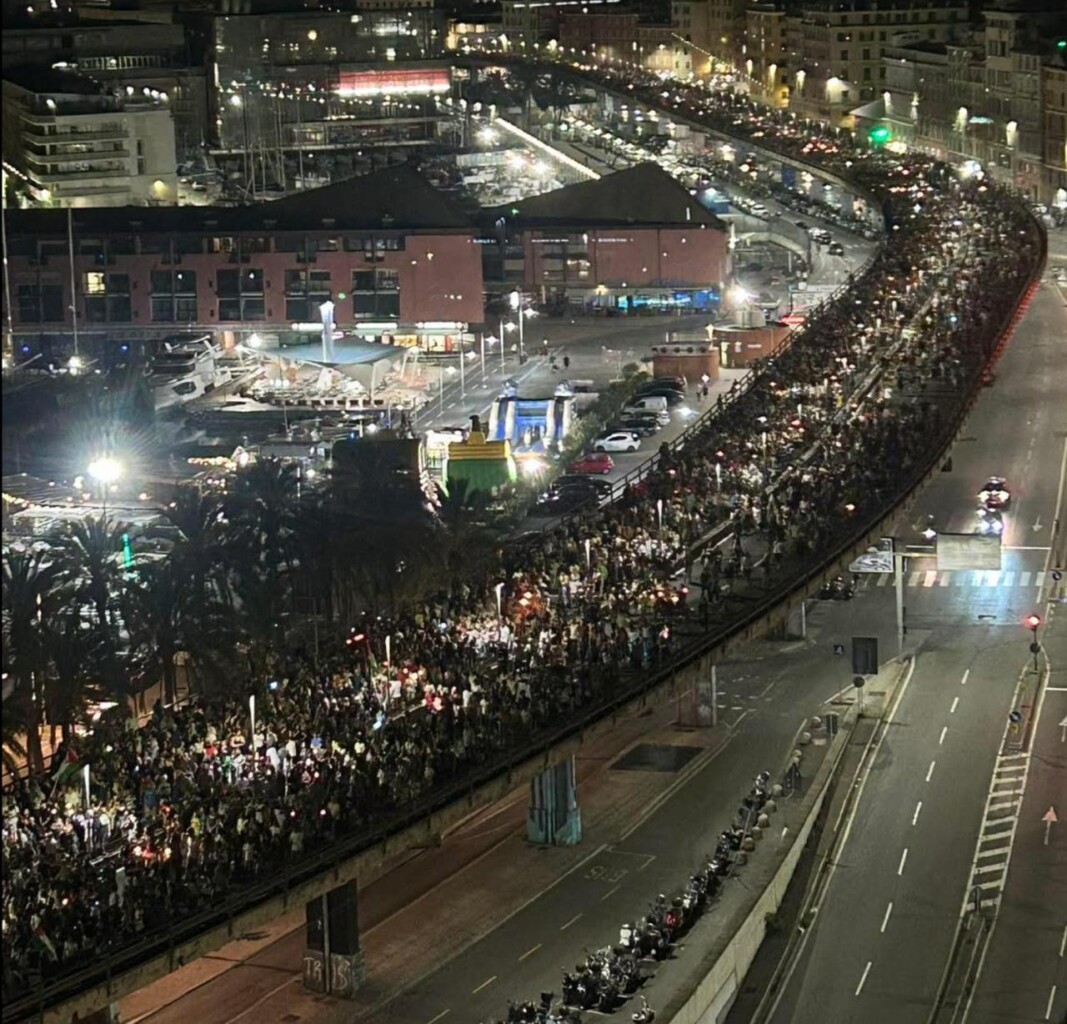Analysis
Genoa takes its solidarity in the streets and at sea with warning of ‘global strike’
Two days after the large demonstration in the city – a recipient of the Gold Medal for the Resistance – the collective mobilization continues to drive the solidarity effort.

A photo of Genoa’s elevated highway overcrowded with marchers, a snapshot of the solidarity torchlight march on Saturday attended by nearly 50,000 people, is making its way around the world. Meanwhile, the boats carrying humanitarian aid for Gaza are also on their way. Despite bad weather and an unfavorable sirocco wind, they are heading toward Catania, where they will join the rest of the Global Sumud Flotilla in Italy before converging with vessels arriving from other European countries.
Two days after the large demonstration in the city – a recipient of the Gold Medal for the Resistance – the collective mobilization continues to drive the solidarity effort. Embarking for Gaza are, among others, Stefano Rebora, president of the Music For Peace association, which collected 300 tons of food in five days, and José Nivoi, spokesman for CALP, the autonomous collective of Genoa port workers that provided the manpower and logistics for the operation.
The first warning to national and international politicians was a direct message from CALP: “If we lose contact with our comrades for just 20 minutes, we will shut down all of Europe. Not even the smallest object will leave the docks of Genoa. It will be a global strike,” dockworker Riccardo Rudino shouted from the stage set up to see the boats off on Saturday evening. The video has been shared hundreds of thousands of times across all social media.
The actual crews will board in Catania on September 4. They are heterogeneous groups with diverse skills and personalities, chosen for balance at every level. “We will receive the right training for the various situations we might face,” says José Nivoi. “Will we make it to Gaza? Will we manage to break the blockade? What happens if someone asks to be taken away? How will we deliver the food? We have to be ready for anything.” The unspoken questions, concerning the scenarios in which the boats will be stopped, are even heavier – particularly after reports that the Israeli government has presented a plan to manage the flotilla’s arrival, which includes using the same arrest procedures as those for individuals considered terrorists.
On this subject, Genoa’s mayor, Silvia Salis, has appealed to Minister of Foreign Affairs and Deputy Prime Minister Antonio Tajani. Beyond expressing her outrage at the Netanyahu government’s statements (“The words of Itamar Ben Gvir are worrying: treating a humanitarian expedition like a group of terrorists shows the level of madness this conflict has reached”), Salis called on Tajani to “monitor the mission with the utmost attention and show a favorable attitude and support from the institutions towards such a highly valuable initiative.”
She emphasized: “I will do everything I can to ensure the spotlight on this expedition does not dim for even a second.” This echoes one of the key requests being made by Music For Peace and, in turn, by the many associations and groups that support it: “The hype is at its peak at the moment of departure,” the NGO says, “but the real challenge comes during the voyage and especially after. We will have to keep the attention alive.”
At the NGOs headquarters, a short distance from the port of Genoa, they are working on setting up a public contact center with the crews via satellite channels, so that citizens can also follow the mission daily and continue to participate, even indirectly, in the mobilization.
Originally published at https://ilmanifesto.it/genova-solidale-per-strada-e-per-mare-la-vera-sfida-e-ora on 2025-09-02
